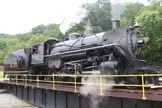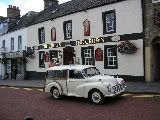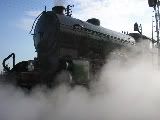Camber
Posted: 14 Oct 2013 22:54
My two cars have different camber angles. Both are negative but the '76 FHC seems to have a couple of degrees more than the '79 DHC. I did a course measurement by putting a carpenters square vertically against the tires and observed the angle between the square and the shop floor. I would estimate a couple of degrees difference between the two cars. The last time I had an alignment on the FHC they measured the camber at -.4 degrees and -.5 degrees. So the DHC is probably on the order of -1.5 to -2.0 degrees.
Because of this difference they handle quite differently. The FHC seems to want to oversteer much more than the DHC. I'm not happy with how the FHC feels. I know those angles are nonadjustable. So could I have some shorter than standard springs in there or would this be just a matter a of production variance? The car doesn't look any lower than it should so I am perplexed.
 [img][IMG]http://i615.photobucket.com/albums/tt234/nickmi/TR7%201975/Yellow.jpg[/img]
[img][IMG]http://i615.photobucket.com/albums/tt234/nickmi/TR7%201975/Yellow.jpg[/img]
nick
'79 TR7 DHC
'76 TR7 FHC
Because of this difference they handle quite differently. The FHC seems to want to oversteer much more than the DHC. I'm not happy with how the FHC feels. I know those angles are nonadjustable. So could I have some shorter than standard springs in there or would this be just a matter a of production variance? The car doesn't look any lower than it should so I am perplexed.
 [img][IMG]http://i615.photobucket.com/albums/tt234/nickmi/TR7%201975/Yellow.jpg[/img]
[img][IMG]http://i615.photobucket.com/albums/tt234/nickmi/TR7%201975/Yellow.jpg[/img]
nick
'79 TR7 DHC
'76 TR7 FHC









